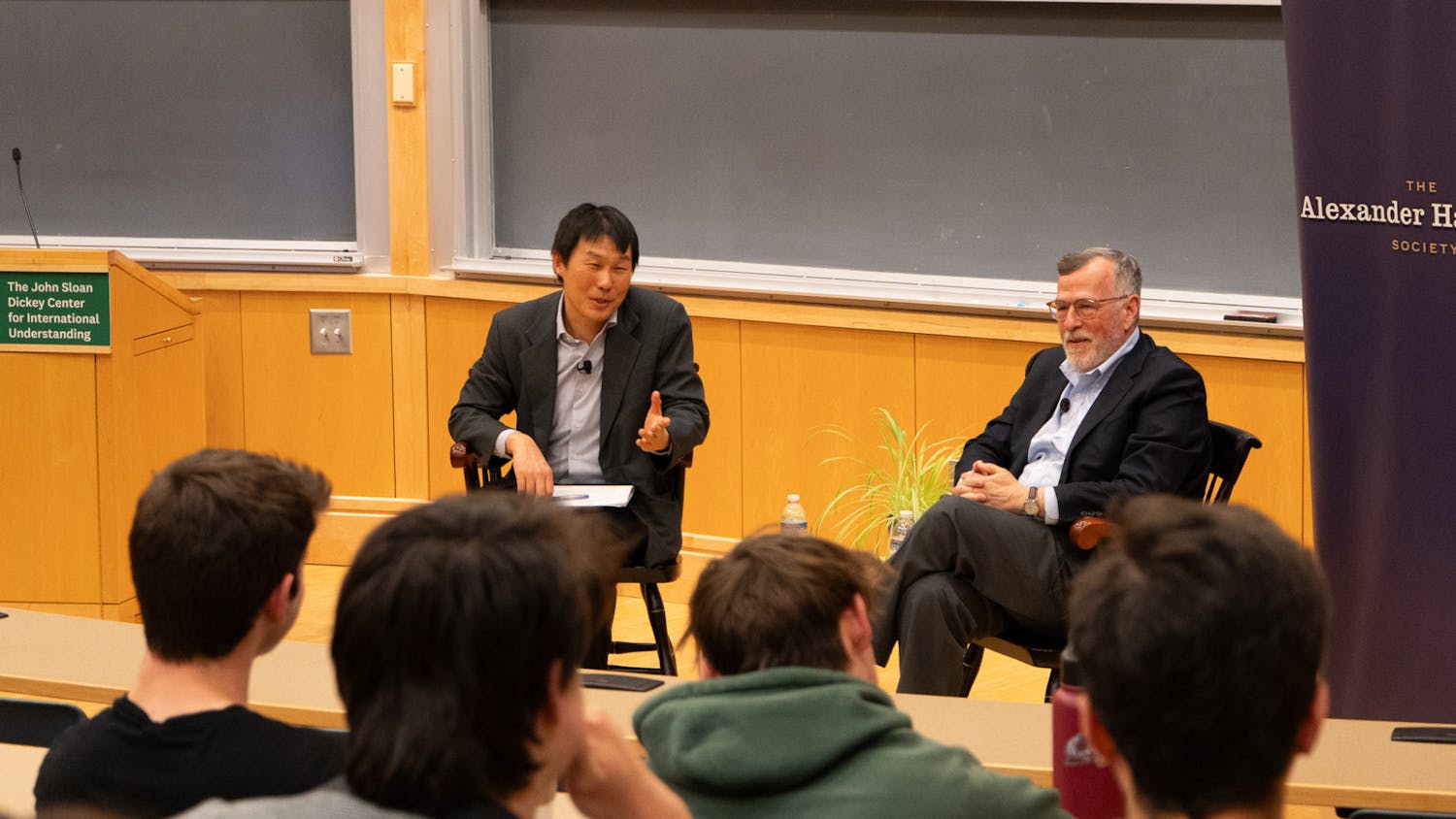While 97 percent of students surveyed by The Dartmouth acknowledged that they are aware that hazing occurs on campus, only about 55 percent said that the administration should take increased action to discourage hazing. Student reaction to the issue of hazing, addressed in a Jan. 25 opinion column by Andrew Lohse '12, ranged from disbelief to disgust.
Of 102 students surveyed in a convenience sample on Sunday, 64 individuals approximately 64 percent said that hazing is a problem on campus and poses a threat to members of the community. About 32 percent said they believe hazing is not a marked problem on campus, while five individuals declined to answer the question. When asked if administrators should take greater efforts to prevent hazing practices, 56 individuals responded in the affirmative, while 42 participants said no, and four chose not to respond.
Lohse's allegations which included specific, graphic descriptions of hazing at his former fraternity and claimed that administrators failed to adequately address his concerns sparked controversy among students and led some to question the author's credibility and motives. Other students, however, said the piece sparked a necessary discussion about both hazing and the function of the Greek system at the College.
"I was a member of a fraternity that asked pledges, in order to become a brother, to: swim in a kiddie pool full of vomit, urine, fecal matter, semen and rotten food products; eat omelets made of vomit; chug cups of vinegar, which in one case caused a pledge to vomit blood; drink beers poured down fellow pledges' ass cracks; and vomit on other pledges, among other abuses," Lohse said.
Stephanie Pareja-Fernandez '13, a member of Alpha Xi Delta sorority, said she was overwhelmed by the notion that students would subject themselves to the rituals described by Lohse.
"I was absolutely disgusted," she said. "I couldn't even wrap my mind around the idea that anything that foul went on."
Pareja-Fernandez also said she found the administration's role difficult to understand, particularly given the voluntary nature of hazing.
"I don't understand whether [Lohse] wants the system abolished, or what exactly he's trying to accomplish," she said.
Whether full responsibility lies with the victim of hazing is unclear, according to Alexis Monroe '13, who is unaffiliated. While outsiders may suggest that potential victims of hazing "just say no," unequal power relationships can leave individuals vulnerable to psychological pressures, she said.
"I wouldn't necessarily blame him," she said. "I don't think it necessarily reflects a personal weakness if someone is in a very power-oriented relationship."
Some students interviewed by The Dartmouth questioned the credibility of the allegations.
Ari Jackson '13, a member of Chi Heorot fraternity, said that Lohse's anecdotes of hazing seemed "skewed" and that he did not believe all of the claims.
Jesse Gomez '12, who is unaffiliated, also expressed reservations about the content of the column and its implications.
"I never suspected Dartmouth of hazing before," he said. "But I'm critical. I question the validity of it, and I'm not sure it's anything to be concerned about."
Lohse's article brings into public view a formerly obscure area of campus life, whether or not the particulars are accurate, Hikaru Yamagishi '12, a member of Kappa Kappa Gamma sorority, said. While students may wish to focus on Lohse's history, his story merely confirms what many have heard in private, she said.
"Student body discussion needs to move away from Andrew Lohse because we're all involved in the Greek system to some extent, and we all know what we know," she said.
Moreover, the allegations bring rumors of hazing that previously circulated informally amongst the student body to the attention of the administration and faculty, who may be able to help address the problem, according to Yamagishi.
Monroe said she questions the ability of administrative intervention to prevent hazing.
Although it is important for the administration to be aware of the issue, its response will probably include "committees, subcommittees and a ton of ineffective bureaucracy," Ben Ludlow '12, vice president of Chi Gamma Epsilon fraternity and Interfraternity Council secretary, said.
While hazing is an important issue that needs to be addressed, Ludlow said he hopes the administration will proceed with caution when acting on "sensationalist and currently uncorroborated allegations."
Any lasting change that may come from the conversation surrounding hazing will have to contend with the fact that Lohse has ostracized himself from mainstream Dartmouth culture, according to Rebecca Rothfeld '14, who is unaffiliated. Attempts to reflect on the implications of Lohse's allegations and the effect of hazing on the Dartmouth community may be dismissed because of the author's reputation, she said.
"Basically, if you read the reactions online, everyone is ignoring the content of his article and just saying, Whatever man, Lohse isn't a sweet bro,'" she said.
Different types of hazing exist for different purposes, not all of which are harmful, Monroe said. Activities that test a pledge's loyalty to a fraternity can foster deep bonds among members, but such bonds are more difficult to discern in sororities, where hazing is almost nonexistent, according to Monroe. The difficulty lies in distinguishing between activities that make pledge term valuable and those that merely test physical endurance or "play into an unhealthy power relationship," she said.
The problem of hazing may prompt students to question the "structure of power and incentives" in the Greek system in general, Yamagishi said.
"We need to evaluate if this is the kind of community we want to leave for another generation of Dartmouth students," she said.
Monroe said sweeping measures against the Greek system would not constitute a "smart" solution.
"I don't think it's a question of policies as much as a question of a change of mindset," she said.
The prospect of hazing has raised anxiety among some freshmen considering the rush process next fall, Patrick Campbell '15 said. While a number of his friends have debated what they would do in a variety of hazing scenarios or reconsidered their intention to rush altogether, Campbell said the campus discussion surrounding hazing has merely "reinforced" his decision not to participate in the recruitment process, he said.
Staff writers Gavin Huang, Leslie Ye and Madeline Zeiss contributed reporting to this article.



